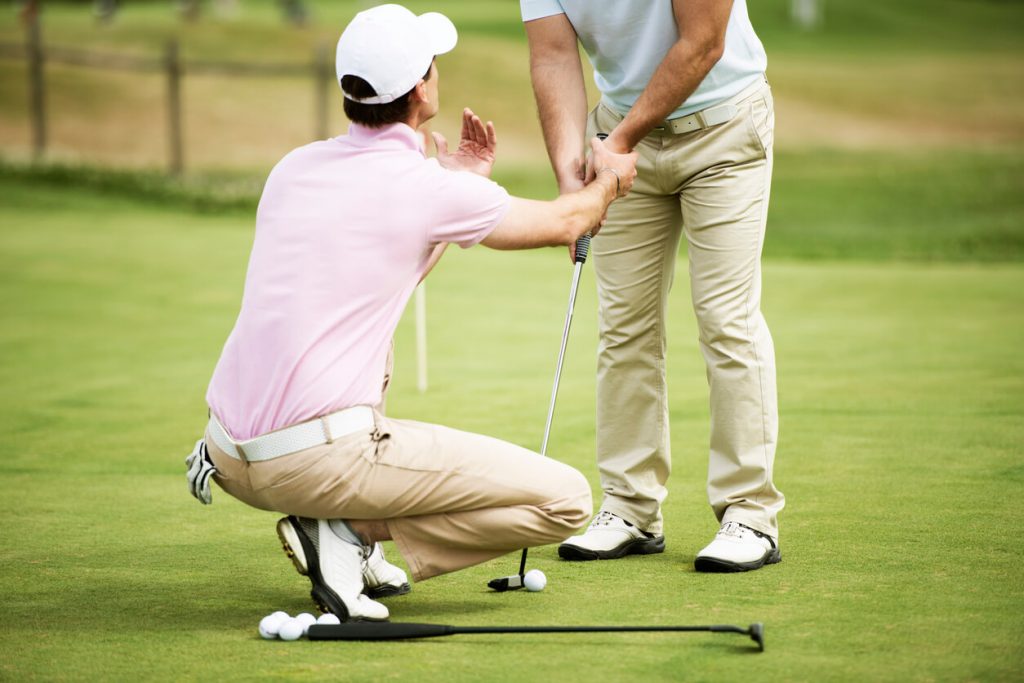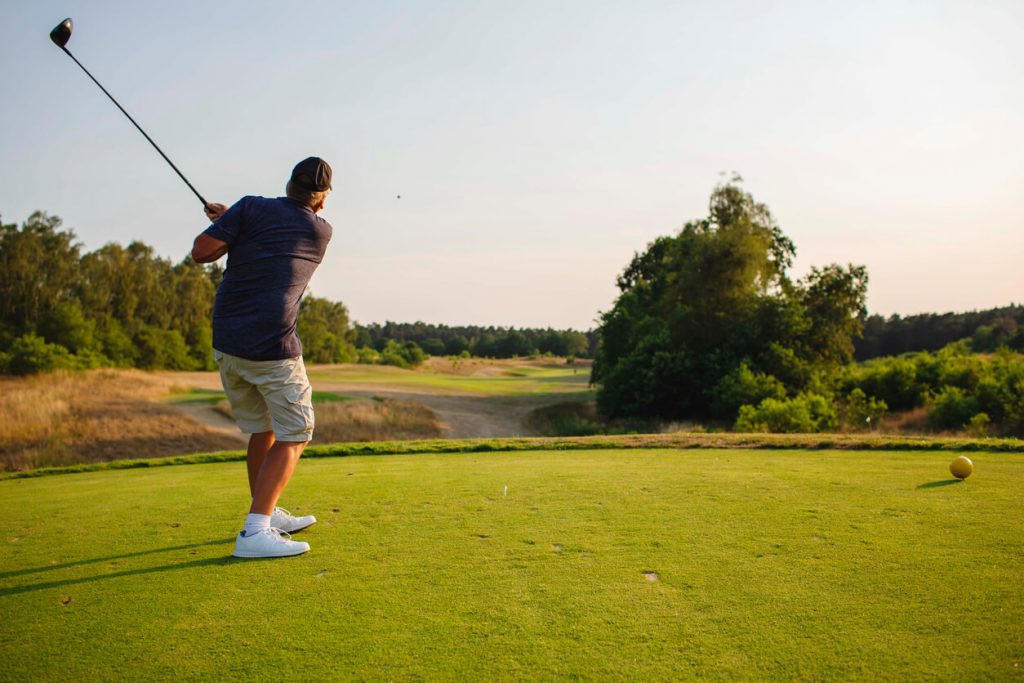How to hit a golf ball further in 7 easy steps

Every golfer strives to improve, from the complete novice to the World’s Number One.
For the average amateur, one of the
most common desires is to know how to hit a golf ball further.
Most of us recognise we’re never
going to be able to send it “out there” like Rory McIlroy, but it would be nice
to be able to consistently reach the fairway off the back tees and,
occasionally, feel a par-5 may be “on in two.”
We’re all getting older, and it would
be easy to view diminishing length on the golf course as a fait accompli. But
it needn’t necessarily be so. All golfers could try some simple ways to find a
few extra yards.
Here are seven tips to help you learn how to get more distance in golf.
1. Slow it down
This might sound counterintuitive, as
it’s undeniable that faster clubhead speeds at impact result in greater
distance. But slowing things down is vital when learning how to get more
distance in golf.
A wild flailing swing does not best
achieve those fast clubhead speeds. Good timing and acceleration through the
ball will make the golf ball travel further.
It doesn’t matter how fast the
clubhead moves away from the ball or how fast the transition is from backswing
to downswing. Speed during this part of the swing is wasted energy and
generally has a destabilising effect.
Try to take the club away slowly and
steadily, complete the backswing, and then transition to your downswing as
slowly as possible.
It would help if you naturally
accelerated through the downswing, and the club head will move at maximum
velocity upon reaching the ball.
Look at some of the longest hitters
in professional golf; their swings seem effortless.
Examine more closely, though, and you’ll see they tend to be relaxed and smooth when it doesn’t matter (on the way back and through the transition). But it’s then that the speed kicks in, where it does matter—as the club nears, and reaches, the ball.
Related: How to grip a golf club in 5 easy steps
2. Strengthen your core
Stability through the swing will
enable you to accelerate through the ball and maximise clubhead speed. This
stability comes from the core—particularly your lower torso.
If you have strong abdominal and
oblique muscles, you can generate more power without losing control, therefore
achieving more distance.
Strengthening the core doesn’t have
to mean hours spent in the gym. It’s easy to do it at home with simple
exercises like the “high plank.” Hold yourself in a high press-up position for
as long as possible and feel your stomach muscles working.
You might not be able to do this for
very long at first, but keep at it, and you’ll soon see improvements.
Alternatively, try the “low plank.” It’s the same but with your elbows on the
ground rather than your hands.
Yoga and Pilates are great for
strengthening the core, and many sports centres and health clubs run classes
targeting golfers.
Apart from learning how to hit the
golf ball further, you’ll also feel generally stronger and less prone to
injuries, particularly to your lower back.
Related: Best golf exercises to improve your game
3. Go for a fitting

This could be the simplest way to
learn how to hit the golf ball further, especially off the tee. If you have the
wrong set-up in your driver, it could be that you’re not getting the most out
of your shots.
If the shaft isn’t right for your
swing, you may produce too much spin, sending the ball up rather than out.
Changing the loft on your driver could optimise ball flight, giving a better
trajectory and greater carry.
Changing to a driver with a draw bias may reduce distance-killing cut spin, while looking at a club with a different weight distribution could improve ball flight and increase distance.
Go to a local pro with the Mizuno Shaft
Optimizer and Swing DNA system or similar ball-flight tracking technology, and see how your
current kit performs.
Then check if the figures can be
improved by new or different equipment. It might cost a few quid, but it’s
perhaps worth it for an extra 10 yards off the tee.
Related: How to play golf on a budget
4. Check your ball
As with clubs, getting the right ball
for your game can increase your distance.
Many amateurs opt for a “premium”
ball, believing that if it’s the choice of the pros, it must be the best you
can buy.
But many premium balls are designed
for players who produce fast clubhead speeds at impact, greater than the speeds
generated by the average amateur.
Below a certain clubhead speed, these
premium balls will not be compressed sufficiently at impact to deliver maximum
spring and distance. That’s why it’s best to shop around when learning how to
hit a golf ball further.
Most major ball manufacturers produce
a range of balls to suit players with different clubhead speeds.
Get your local pro to measure your
clubhead speed and then consider the available options. It won’t necessarily be
the most expensive ball that helps you to hit the golf ball further.
Related: The 12 best golf balls on the market
5. Try to hit a draw

The draw is the Holy Grail for most
club players, but producing one is a challenging prospect for the
majority.
But in terms of learning how to get
more distance in golf, it’s well worth trying—in flat conditions with the same
impact speeds, a ball hit with draw spin will travel further than one hit with
cut spin.
When you open the face and cut across
the ball, you increase the club’s loft and impart more backspin and sidespin.
This causes the ball to climb—much of
the energy you have transplanted goes into upward rather than outward movement.
The more you can reduce the effects
of the distance-sapping cut, the further your golf ball will fly. You don’t
have to hit the ball from right to left to get results. Just try to hit a draw,
lessen the cut, and you’ll see improvements.
So, ensure your grip isn’t too weak. The v created by the thumb and forefingers on both hands should point to your right shoulder. Check your set-up is square to the ball—feet, hips, knees, and shoulders should all be pointed straight at the target.
If you have a cut, the temptation is
to aim left to compensate, but by opening up to the target, you exacerbate the
problem, increasing the out-to-in, cut-inducing swing.
Then, as you swing, try to envisage a
draw and what the clubface must do to create one—effectively wrapping itself
around the right side of the ball. Imagine a topspin forehand in tennis.
Related: How to hit a draw in 5 quick steps
6. Improve centre contact
One of the best ways to learn how to
hit a golf ball further is to work on your centre contact.
This means improving your consistency
with hitting the ball with the centre of the club face.
Many amateur golfers either hit the
ball with different areas of the club face or choose the wrong spot initially.
Even being one inch away from the centre can significantly reduce your
distance.
By improving this, you will not only
learn how to get more distance in golf, but your shot consistency will be better overall.
Check out this video from Canadian
Fade Golf for a useful drill:
Related: How to improve your contact with every club
7. Practise shifting your weight
Developing your swing technique by
learning how to shift your weight properly is a great way to achieve more
distance in golf.
You should keep your hips loose and
use them to drive the club through your swing. This creates momentum during
your downswing and increases club head speed for a more powerful impact.
During your backswing, you should shift up to around 60% of your weight onto your back leg as you reach the movement’s peak.
By the time you reach the bottom of
your downswing, your front leg should be supporting around 90% of your body
weight.
This takes practice, but it’s one of the most valuable ways of learning how to hit a golf ball further.
Once you’ve got a solid technique,
you may want to protect yourself before heading out on the green.
At Golf Care, we arrange specialist golf insurance that includes Public Liability
up to £10m, equipment cover up to the value of £7,500, and much more. We also
provide three free rounds of golf with each policy!
Click the banner below to learn more about our cover and get an instant online quote.








